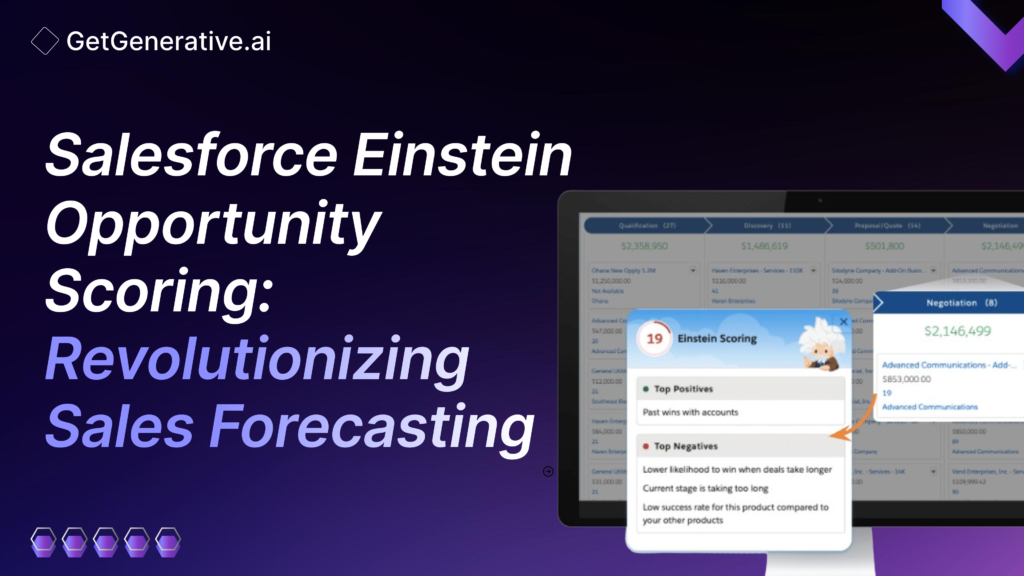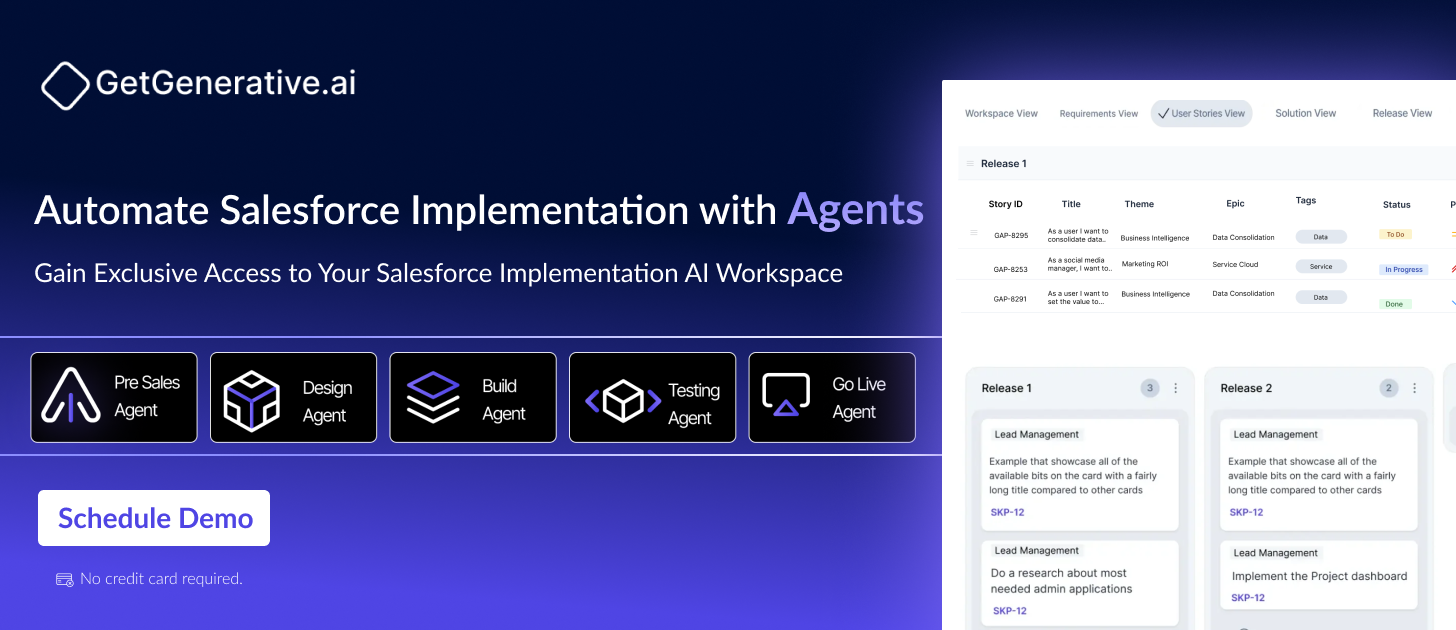Salesforce Einstein Opportunity Scoring: Revolutionizing Sales Forecasting
A CSO Insights conducted a study revealing that less than 53 percent of sales representatives are meeting or exceeding their quotas. This shows the need for more efficient sales forecasting and opportunity prioritization. Say hello to Einstein Opportunity Scoring, an AI game-changing feature inside Salesforce that turns the sales team’s prediction and prioritization of opportunities on their heads.
Einstein Opportunity Scoring has been making waves in the sales industry, with companies reporting significant improvements in their sales performance. Moreover, the adoption of AI in sales is on the rise, with a Gartner survey indicating that by 2025, 60% of B2B sales organizations will transition from experience- and intuition-based selling to data-driven selling. Einstein Opportunity Scoring is at the forefront of this trend, empowering sales teams with predictive insights and data-driven decision-making capabilities.
In this blog post, we’ll explore Einstein Opportunity Scoring’s functionality, benefits, and how it can transform your sales forecasting. We’ll also compare it with traditional sales forecasting methods and provide a step-by-step implementation guide within your Salesforce environment. Get ready to unlock the full potential of your sales team with Einstein Opportunity Scoring.
What is Einstein Opportunity Scoring?
Einstein Opportunity Scoring is an AI-powered tool within Salesforce that analyzes vast amounts of historical sales data to predict the likelihood of an opportunity closing successfully. It goes beyond traditional sales forecasting methods by leveraging advanced machine learning algorithms to identify patterns and insights that may not be apparent to the human eye.
At its core, Einstein Opportunity Scoring is designed to help sales teams prioritize their efforts and focus on the opportunities that are most likely to convert into closed deals. By assigning a score to each opportunity, ranging from 1 to 99, Einstein Opportunity Scoring provides a clear and objective measure of an opportunity’s potential success.
How does Einstein Opportunity Scoring work?
At its core, Einstein Opportunity Scoring leverages machine learning algorithms to analyze your organization’s sales data. It takes into account a wide range of variables, including:
- Opportunity stage and age: Einstein Opportunity Scoring analyzes the current stage of the opportunity and how long it has been in the pipeline, providing insights into the likelihood of it progressing to the next stage and ultimately closing.
- Customer engagement and behavior: By tracking customer interactions, such as email responses, meeting attendance, and content engagement, Einstein Opportunity Scoring can gauge the level of interest and engagement from the prospect, which is a strong indicator of their likelihood to convert.
- Past sales trends and patterns: Einstein Opportunity Scoring leverages historical sales data to identify patterns and trends that have led to successful closures. It considers deal size, industry, and sales cycle length to provide more accurate predictions.
- Competitive landscape: By analyzing external data sources, such as industry trends and competitor activity, Einstein Opportunity Scoring can provide insights into the competitive landscape and how it may impact an opportunity’s success.
By processing this data, Einstein Opportunity Scoring generates a predictive score for each opportunity, typically ranging from 1 to 99. A higher score indicates a greater likelihood of the opportunity closing successfully.
Benefits of Einstein Opportunity Scoring in Salesforce
Implementing Einstein Opportunity Scoring within your Salesforce environment offers numerous benefits, including:
- Improved sales forecasting accuracy: By leveraging AI-driven insights, Einstein Opportunity Scoring provides more accurate predictions of which opportunities will likely close, enabling sales teams to focus on the right deals.
- Increased sales productivity: With Einstein Opportunity Scoring, sales reps can prioritize their time and resources on the opportunities that matter most, reducing the time spent on low-value leads and increasing overall productivity.
- Enhanced decision-making: The predictive scores generated by Einstein Opportunity Scoring empower sales managers to make data-driven decisions, such as resource allocation and pipeline management.
- Seamless integration with Salesforce: As a native Salesforce feature, Einstein Opportunity Scoring seamlessly integrates with your existing sales processes and workflows, requiring minimal setup and training.
“Success in creating AI would be the biggest event in human history. Unfortunately, it might also be the last, unless we learn how to avoid the risks.”
– Stephen Hawking, theoretical physicist and cosmologist
Comparing Einstein Opportunity Scoring with traditional sales forecasting methods
Sales forecasting has always been a critical component of any successful sales strategy. However, traditional sales forecasting methods often fall short in accuracy and efficiency. Let’s look at how Einstein Opportunity Scoring compares to these traditional approaches.
Gut instincts and intuition
One of the most common traditional sales forecasting methods relies on sales professionals’ gut instincts and intuition. While experienced sales reps may know which opportunities are more likely to close, this approach is highly subjective and prone to bias.
In contrast, Einstein Opportunity Scoring removes the subjectivity from the forecasting process by leveraging data-driven insights. It analyzes vast amounts of historical sales data to identify patterns and trends that may not be apparent to the human eye, providing a more objective and accurate assessment of an opportunity’s potential.
Also Read – Einstein Discovery: Salesforce AI Tool for Transformative Data Insights
Manual spreadsheets and calculations
Another common traditional approach to sales forecasting involves manual spreadsheets and calculations. Sales teams often rely on complex formulas and manual data entry to estimate the likelihood of an opportunity closing. However, this process is time-consuming and error-prone and fails to consider the full breadth of factors that influence an opportunity’s success.
Einstein Opportunity Scoring automates this process, allowing sales teams to focus on high-value activities such as engaging with customers and closing deals.
Limited data points and historical analysis
Traditional sales forecasting methods often rely on limited data points, such as past sales performance and revenue targets. While these metrics are important, they fail to consider the factors that impact an opportunity’s success, such as customer engagement, market trends, and competitive landscape.
On the other hand, Einstein Opportunity Scoring takes a holistic approach to sales forecasting. It considers a wide range of internal and external data points, providing a more comprehensive and accurate picture of an opportunity’s potential. By analyzing historical sales data, customer behavior, and market trends, Einstein Opportunity Scoring can identify patterns and insights that traditional methods may overlook.
Lack of real-time insights
In today’s fast-paced sales environment, real-time insights are critical for making informed decisions and adapting to changing circumstances. Traditional sales forecasting methods often provide a static snapshot of an opportunity’s potential, failing to account for real-time changes in customer behavior, market conditions, or competitive landscape.
On the other hand, Einstein Opportunity Scoring provides real-time insights and predictions. As new data is entered into Salesforce, Einstein Opportunity Scoring updates its predictions accordingly, ensuring that sales teams always have access to the most up-to-date and accurate information.
The power of AI and machine learning
The most significant advantage of Einstein Opportunity Scoring over traditional sales forecasting methods is its use of artificial intelligence and machine learning. These cutting-edge technologies enable Einstein Opportunity Scoring to analyze vast amounts of data, identify complex patterns and relationships, and improve its predictive accuracy over time.
Einstein Opportunity Scoring harnesses the power of AI to provide sales teams with unprecedented insights and efficiency, giving them a significant competitive edge in today’s market.
Also Read – Einstein Prediction Builder: Empowering Salesforce With AI-Driven Insights
How to implement Einstein Opportunity Scoring?
Implementing Einstein Opportunity Scoring within your Salesforce environment is a straightforward process:
- Ensure you have the necessary Salesforce edition: Einstein Opportunity Scoring is available in Salesforce Enterprise, Performance, and Unlimited editions.
- Enable Einstein Opportunity Scoring: Navigate to the Salesforce Setup menu and enable Einstein Opportunity Scoring for your organization.
- Configure scoring parameters: Customize the scoring model based on your organization’s specific needs and preferences, such as selecting the fields to consider and adjusting the weightage of different factors.
- Train the model: Allow Einstein Opportunity Scoring to analyze your historical sales data and train its predictive model. This process typically takes a few days to complete.
- Integrate into your sales workflow: Once the model is trained, Einstein Opportunity Scoring will automatically assign scores to your opportunities, which can be viewed within the Salesforce interface.
What makes Einstein Opportunity Scoring essential for modern sales teams?
In today’s competitive sales environment, organizations need every advantage to stay ahead of the curve. Einstein Opportunity Scoring provides that edge by leveraging the power of AI to optimize sales processes and improve forecasting accuracy. By focusing on the most promising opportunities, sales teams can maximize conversion rates, reduce sales cycles, and drive revenue growth.
Moreover, as customer expectations evolve, sales teams must be agile and responsive to changing market dynamics. Einstein Opportunity Scoring enables organizations to adapt quickly by providing real-time insights and predictive scores, allowing sales reps to adjust their strategies.
How does Einstein Opportunity Scoring improve sales conversion rates?
Einstein Opportunity Scoring improves sales conversion rates by enabling sales teams to prioritize the most promising opportunities. By focusing their efforts on deals with a higher likelihood of closing, sales reps can allocate their time and resources more effectively, leading to increased conversion rates.
Furthermore, Einstein Opportunity Scoring provides valuable insights into the factors that influence a deal’s success, such as customer engagement and past sales patterns. With this knowledge, sales reps can tailor their approach to address specific customer needs and overcome potential obstacles, further improving their chances of closing the deal.
Also, check – Top Salesforce AI Tools 2025 – The Ultimate List
Conclusion
Einstein Opportunity Scoring is a game-changer for sales teams looking to optimize their forecasting and improve their conversion rates. By harnessing the power of AI and machine learning, Einstein Opportunity Scoring provides accurate and reliable predictions, enabling sales reps to focus on the most promising opportunities. With its seamless integration into Salesforce and data-driven insights, Einstein Opportunity Scoring is an essential tool for modern sales teams looking to stay ahead in today’s competitive landscape.
Visit GetGenerative.ai to explore more about Salesforce and AI.
Frequently Asked Questions (FAQs)
1. Is Einstein Opportunity Scoring available in all Salesforce editions?
It is available in Salesforce Enterprise, Performance, and Unlimited editions.
2. How long does it take to train the Einstein Opportunity Scoring model?
Depending on the volume and complexity of your historical sales data, the training process typically takes a few days.
3. Can I customize the scoring model based on my organization’s specific needs?
Yes, you can configure the scoring parameters to align with your organization’s unique requirements, such as selecting the fields to consider and adjusting the weightage of different factors.
4. How often does Einstein Opportunity Scoring update the predictive scores?
Einstein Opportunity Scoring updates the predictive scores in real-time as new data is entered into Salesforce, ensuring that sales teams always have access to the most up-to-date insights.
5. Can Einstein Opportunity Scoring integrate with other Salesforce features and tools?
Yes, Einstein Opportunity Scoring seamlessly integrates with various Salesforce features, such as Sales Cloud, Service Cloud, and Analytics, enabling organizations to leverage AI-driven insights across their entire sales ecosystem.




